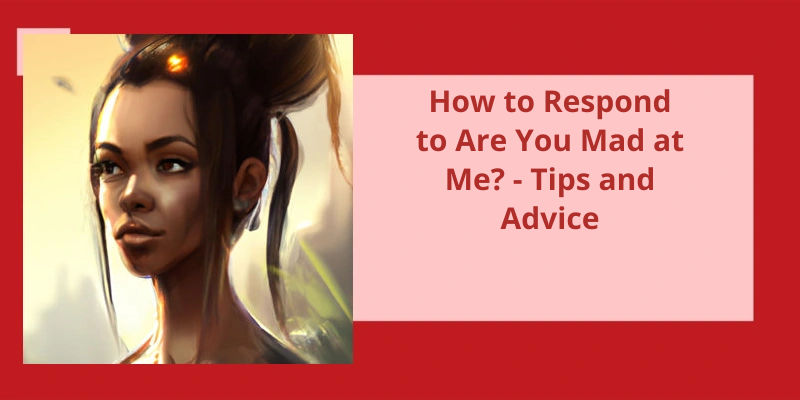Human interactions are complex and often come with a fair amount of emotional baggage. It isn’t uncommon for people to feel apprehensive or unsettled when faced with the question, "Are you mad at me?" Perhaps, you’ve asked this question yourself or have been on the receiving end of it. It's a question that can be laden with undertones of guilt, fear, and expectation. Responding to it in a way that’s honest and transparent can be challenging. There are several things to consider when responding to someone's inquiry about whether or not you're upset with them. From assessing your own emotional state to managing their expectations, finding the right words can make all the difference. In this article, we'll explore some effective strategies for navigating this delicate situation while maintaining a positive and respectful relationship.
How Do You Politely Tell Someone You’re Mad at Them?
Before confronting someone about their actions that have upset you, it’s important to take a step back and try to understand the situation from their perspective. This can help you approach the conversation more calmly and with empathy, rather than just lashing out in anger. By understanding their reasoning or intentions, you may find that your anger dissipates or that you can approach the situation collaboratively to find a solution.
When it comes time to actually have the conversation, approach it with a calm demeanor and a desire to communicate openly. Avoid accusatory language or playing the blame game. This only puts the other person on the defensive and makes it harder to have a productive conversation. Instead, focus on your own feelings and experiences and how their actions impacted you specifically. This way, you can avoid making assumptions or generalizations about their behavior and instead focus on a more specific and actionable conversation.
It may also be helpful to let the other person speak and offer their own perspective before responding. This can help to ensure that both parties have a chance to communicate fully and that no one feels like they’re being unfairly attacked or judged. Try to actively listen and ask clarifying questions to ensure that you fully understand their perspective before responding.
Finally, it’s important to be clear about your expectations moving forward. This could involve setting boundaries, outlining specific behaviors that aren’t acceptable, or simply asking the other person to apologize or acknowledge the impact of their actions. Whatever your expectations may be, make them clear and actionable so that both parties can understand how to move forward.
Overall, the key to politely telling someone youre mad at them is to approach the conversation with empathy, openness, and a desire for understanding. Avoid playing the blame game and instead focus on your own experiences and feelings. By communicating effectively and setting clear expectations, you can help to repair and strengthen your relationships with others.
Strategies for Managing Your Emotions During the Conversation.
- Breathe deeply and consciously.
- Acknowledge and validate your own emotions.
- Practice active listening.
- Use “I” statements instead of “you” statements.
- Practice empathy.
- Take breaks when necessary.
- Use humor or positive language if appropriate.
- Find a supportive friend or therapist to talk to afterwards.
When it comes to expressing anger, using direct language can sometimes make a situation worse. Instead, choosing more nuanced words can help you communicate your emotions effectively without escalating the situation. By labeling your anger with specific words, you’ll gain a better understanding of what actions you should take to address the issue at hand.
How Do You Say I’m Mad Without Actually Saying It?
Sometimes, emotions can get the best of us, and it can be challenging to express how we feel without coming across as angry. There are many ways to communicate your frustration without using the old adage, “Im mad.”. Instead, it would be best to label your emotions to be more nuanced, which may help the other person to understand how you feel.
For instance, you may feel disappointed or unimportant if someone forgot something that was important to you. If thats the case, you can express your frustration by saying how you feel. You could say, “I understand that you forgot, but I feel disappointed that you didnt remember how important it was to me.”
Similarly, if someone let you down or didnt support you, it’s natural to feel hurt or forgotten. So, instead of saying, “Im mad that you didnt support me,” you could try saying, “I feel forgotten and hurt that you didnt show up when I needed you.”
It’s also common to feel frustrated or bugged if someones actions or words are irritating you. In that case, you can say something like, “I feel bugged by your behavior,” or “Your words are frustrating, and I don’t appreciate them.”
For situations where someone left you hanging or abandoned you in a time of need, you might feel left in a lurch. You can communicate this by saying something like, “I feel abandoned and left in a lurch when you didnt show up when you said you would.”
Lastly, if you feel angry or irritated over a trivial matter, you might feel miffed. You could express this as “I feel miffed that something so small is causing so much frustration.”. In this case, it’s essential to communicate that youre annoyed, but not necessarily angry.
By being more nuanced in your labeling, and using more descriptive terms, you can communicate your feelings with better accuracy, and help the other person understand your emotions without coming across as angry.
Conclusion
In conclusion, responding to the question "Are you mad at me?" requires empathy, clear communication and proactive approach. When approached with such a question, it's essential to listen intently to the person, understand where they’re coming from, and clarify any ambiguities concerning the situation. Furthermore, using "I" statements rather than blaming and shaming language can help diffuse the situation and create a healthy dialogue. It's also important to address any underlying issues that may be causing the person to ask such a question and address it amicably. Lastly, responding to the question with kindness and an open attitude can improve the relationship and foster a positive environment for both parties. Ultimately, how one responds to "Are you mad at me?" speaks volumes about their emotional intelligence and maturity, determining the fate of the relationship.






